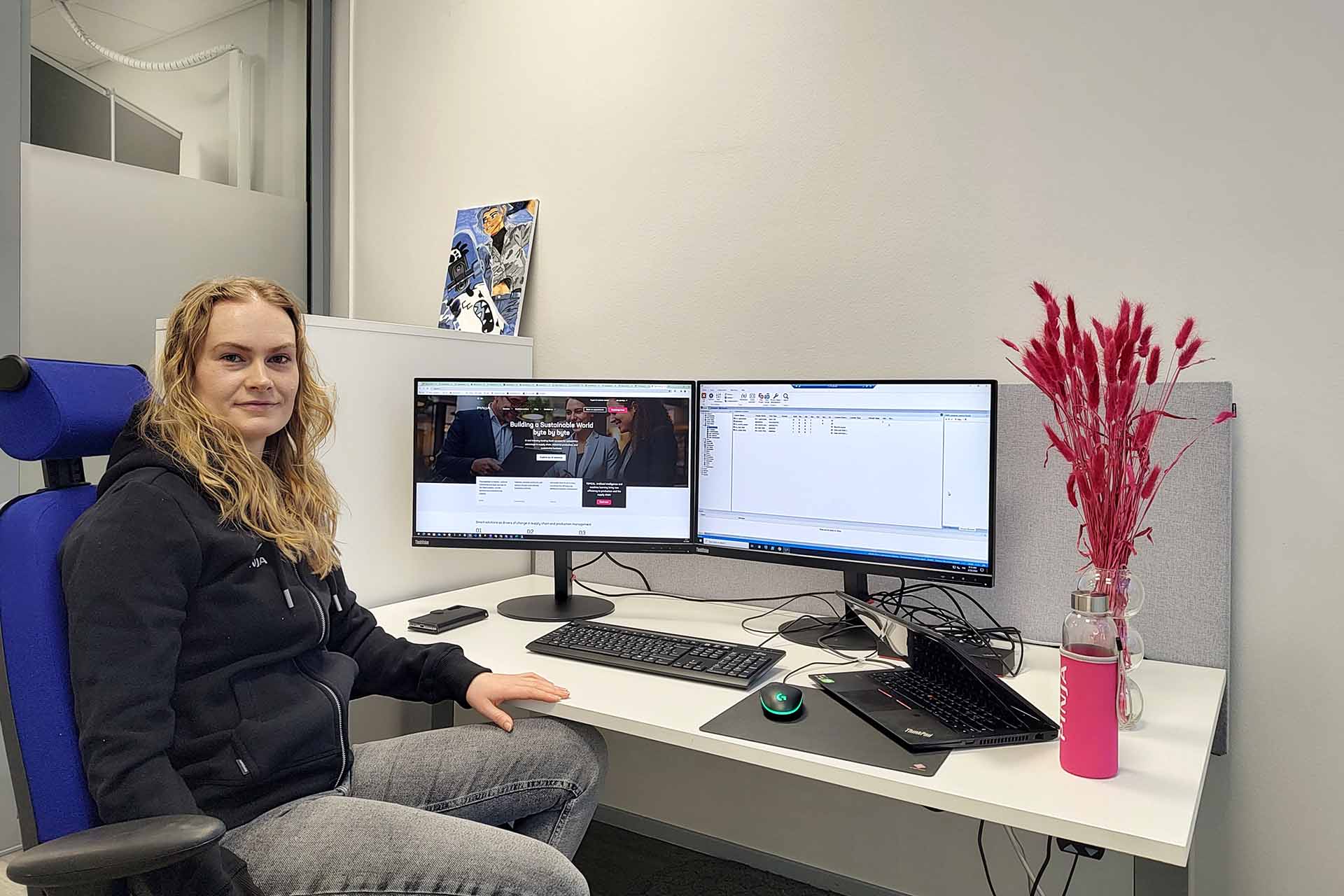
Data Engineer Aira, a data warehouse specialist at Pinja, values the meaningfulness, social impact and the opportunity to continuously develop and learn more in her job. An important part of enjoying the work is also having a team, where she can share her experience with other team members whenever necessary.
Data warehousing is constantly evolving, and so are the people behind it
Aira, who started working at Pinja in early 2023, has a Master’s degree in Economics and Business Administration, and her interest and education were already focused on information systems during her studies. She has worked in data warehousing since 2016.
- I chose to focus on information systems already during my studies in economics at Aalto University. At Pinja, I am currently working in the BI team on the health and well-being technology side, with clients such as wellbeing services counties. Among others, I have worked on projects for the Hospital District of Helsinki and Uusimaa. We build data platforms for clients, collecting data from different data sources. This data is processed in such a way that the client can use it for a specific purpose, for example, for reporting, Aira says.
For Aira, one important factor for starting at Pinja is the training promise, which allows each Pinja employee to spend 10 days each year developing their skills and expertise. You can use the training days according to your interests.
- Last year I participated in, for example, the SQL Bits training event, where lectures covered Microsoft tools from different perspectives. In addition, I have used training days to learn Python, among other things. Our industry is so broad and changing that it is not difficult to find subjects for further training. For me, at least, it has been more about being able to choose the subjects that make the most sense to study further right now and that help me in my work, says Aira.Data Engineer jobs form a whole umbrella
Aira is currently working in Pinja’s 40+ person team focused on health and wellbeing technology, and she is involved in implementing data warehouse solutions required by wellbeing services counties. She values the meaningfulness, relevance, and social impact of her role. At the same time, she points out that not all Data Engineer jobs represent a single format, and that there can be big differences in job descriptions and daily work tasks.
- Naturally, the very fact that projects change brings variety to the work. The technical implementation of projects and the tools used vary, the scale of clients and projects differ, and the size of the team also varies. It’s great to have a lot of experienced people in my team and in the wider Business Intelligence unit to ask for help and tips, Aira says.
Data Engineer jobs also vary in that some involve working directly at the client interface, while others take place in the background. Especially in large projects, not all developers are necessarily in direct contact with clients, but all are driven by client needs.
The reporting capabilities enabled by data warehousing are important for clients, as they gain an understanding of what is really happening in the organization.
- It is useful to be able to talk about technical issues in a way that is understandable to clients. This allows you to explain to the client what the implementation of their needs means from a technical point of view. On the other hand, much of our work also takes place in the background, for example, when we handle automation, scripts, and other tasks to ensure the smooth running of the service.
However, the common factor is that Data Engineer jobs typically require both an understanding of the big picture and a certain level of granularity.
- My personal view is that as a Data Warehouse Specialist and Data Engineer, you have to like tinkering with data. For example, if there is a data type problem, you have to tinker with it a bit. However, you also need to have the ability to see the big picture, Aira says.
What is it like to work as a Data Engineer at Pinja?
- At Pinja, you can focus on data warehousing, reporting, or both, depending on your interests.
- The tools vary somewhat among projects and clients.
- The data platform is usually Azure cloud services.
- For example, traditional SQL databases or DataLake/Lakehouse are used in the background of the data warehouse. Microsoft Fabric as a new product will also play an important role in the future.
- Depending on the projects, the data is modeled with Data Vault or dimensionally.
- Design and implementation of the data warehouse ETL solution, using tools such as WhereScape , SSIS, or Azure Data Factory.
- Data warehouses are often implemented on top of SQL databases, so data analysis with SQL is used to support modeling and ETL design.
- In some of our projects, we also use Databricks, one of the benefits of which is not being dependent on language (Python, SQL, Scala, R..). However, as a language, SQL is a foundation stone that allows you to get up to speed fast.
“How is our organization doing?”
Aira describes the relevance of her work as helping clients understand how their organization is doing, for example. In the area of health and well-being technologies, the impact is particularly clear, but the same is true for other sectors. The collected data helps make the activities and their success visible and continuously improve them.
- The reporting capabilities enabled by data warehousing are important for clients, as they gain an understanding of what is really happening in the organization. Part of my job is to go through their needs with them and listen to what they want to report, for example. Personally, I’ve always liked being in direct contact with the client – that’s kind of the point of the whole job for me.
Having fun at work and the support of colleagues are also important. We also spend time together outside of work from time to time, for example, paddle boarding, climbing, or, in the summer, going on a boat trip.
- I consider having a team an important part of my work. When the atmosphere is open, people dare to ask questions about ambiguities. It is important that everyone can express their opinions, and, if necessary, raise problems. This is the case in my team at Pinja. It allows you to feel good about your work, says Aira.Read more
Pinja is developing one of Europe’s largest healthcare data warehousing solutions for the Hospital District of Helsinki and Uusimaa
The BI and reporting partnership with Pinja provided an overview of HUS’s operating room activities
See all our vacancies
Check out the career stories of Pinjans
Business Intelligence Architect Aleksi enjoys problem solving
Back to the Pinja Blog
Categories
- Career at Pinja (68)
- Manufacturing (46)
- Knowledge Management (45)
- Production Development (44)
- Software Partnership & Tools (42)
- Sustainability (37)
- Wood and Forestry (37)
- Bioenergy and Recycling (29)
- IT Support and Outsourcing (24)
- Ecommerce (23)
- Maintenance (22)
- Artificial Intelligence and Machine Learning (15)
- Public Services (9)
- Compliance (1)
